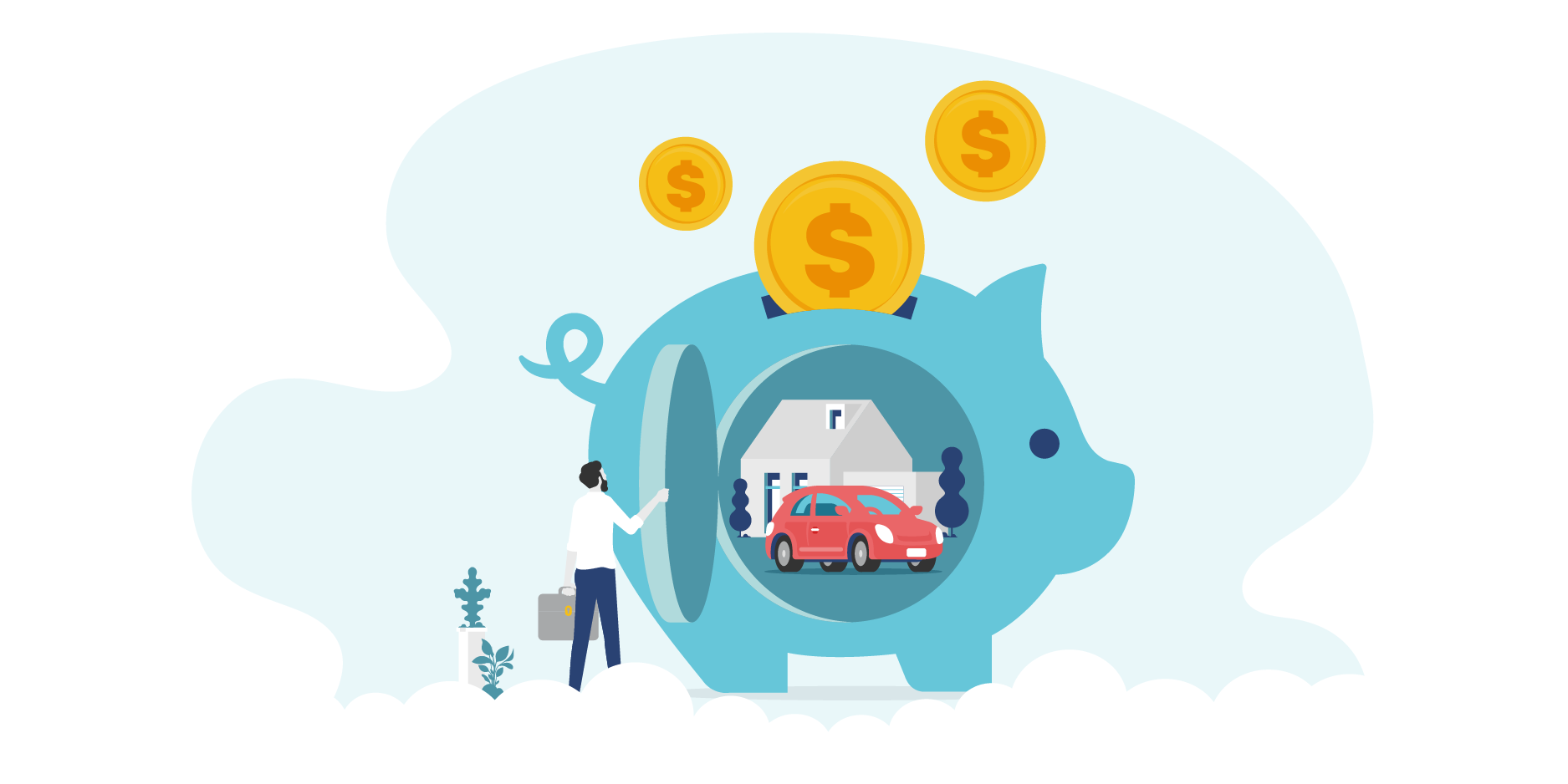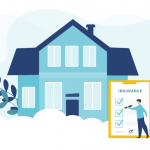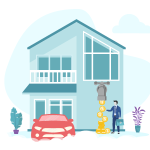10 Smart Upgrades to Save You Money on Home & Auto Insurance
July 1, 2025

Some of the smartest upgrades you can make to your home or vehicle aren’t just for comfort, style, or convenience—they can actually save you money in the long run. While it’s easy to think of these enhancements as added expenses, many of these improvements can lower your risk profile in the eyes of your insurance provider. That means smaller premiums, fewer claims, and potentially significant financial benefits over time.

Whether you’re already planning upgrades or simply exploring ways to protect your home or car more effectively, there are plenty of cost-saving options to consider. To help you out, here’s a closer look at some small investments you can make that will pay off in more ways than one:
Home Upgrades
1. Security Systems
A security system might seem like a luxury, but that added layer of protection can make all the difference if your home is ever targeted. Fortunately, modern security systems come in all shapes and sizes—and price points—ranging from simple video doorbells and smart locks to fully monitored alarms with professional oversight.
Whether your security system is high-tech or no-frills, simply having one installed at home is one of the most effective ways to deter criminals, reduce your risk of theft, and give you greater peace of mind. And what’s even better? Many insurance providers even offer premium discounts for having a verified home security system in place, turning your smart investment into long-term savings.
RELATED: Locks, Camera, Discounts: 10 Home Security Tips to Protect Your Home
2. Water Damage Prevention Systems
Water damage is one of the most common and costly types of Home Insurance claims, but with the right prevention tools, you can significantly reduce your risk. Devices like water leak detectors, sump pumps with backup power, backwater valves, and automatic shutoff systems can help catch problems early or stop them before they escalate—and make you eligible for a discount on your Home Insurance.
RELATED: 6 Common Home Insurance Claims—and How to Avoid Them
3. Upgraded Windows & Roofing
Replacing outdated windows and roofing materials can go a long way in reducing the likelihood and severity of damage during a storm or wildfire—and potentially lead to lower insurance premiums too.
Features like storm shutters, triple-pane or tempered glass windows, and impact-resistant shingles or metal roofing boost your home’s overall resilience and lower your risk level in the eyes of your insurer. Even if you do need to file a claim after sustaining damage or loss, having proven weatherproof upgrades in place can work in your favour during the claims process and reduce the risk of a denial.
RELATED: Severe Weather Events: Is Your Home Covered?
4. Structural & Plumbing Updates
If you live in an older home, replacing outdated electrical, heating, and plumbing systems is essential to lower your risk of fires and leaks while increasing the overall safety and efficiency of your home. From an insurance standpoint, these modernization updates make your home less susceptible to costly claims, which could translate into lower premiums or access to broader coverage options.
RELATED: 10 Factors That Affect Your Home Insurance Premiums
5. Energy Efficiency Upgrades
Investing in energy-efficient upgrades isn’t just great for the planet—it can also be good for your wallet. Improvements like installing solar panels, upgrading insulation, using energy-efficient appliances, or replacing your HVAC system with a more efficient model can significantly lower your utility bills and increase your home’s overall value.
While not all energy-efficient features automatically qualify for insurance discounts, some insurers do offer green home endorsements, incentives for eco-conscious improvements, and/or coverage for sustainable rebuilding materials after a loss.
RELATED: How Climate Change is Shaping Home Insurance
Auto Upgrades
1. Anti-Theft Devices
Consider investing in theft prevention devices to make your vehicle a less attractive target for thieves and increase the chances of recovery if it’s stolen such as a steering wheel lock, car alarm, or Tag, North America’s top stolen vehicle tracking and recovery system.
Many insurers recognize this added layer of protection and offer discounts—typically ranging from 5–15%—for factory-installed or certified aftermarket security systems. In some cases, not having a theft-prevention device could even lead to surcharges, especially if you live in a high-theft area. While you can’t control the actions of others, taking proactive steps to secure your car can make all the difference in reducing your risk level and your insurance premiums.
RELATED: Car Theft Surges in Canada: Are You Covered?
2. Dash Cams
In the event of an incident, a dash cam can provide valuable, unbiased evidence to help prove what really happened. It can potentially save you from being wrongly held liable in a not-at-fault collision and protect you from false claims, hit-and-runs, or insurance fraud.
While insurers don’t typically offer discounts for dash cam use, having footage on hand can strengthen your case in a dispute and help speed up claim investigations, leading to quicker payouts. Plus, knowing you’re being recorded can promote safer driving habits, which over time can help you maintain a clean driving record to keep your premiums low.
RELATED: All About Auto Insurance Fraud—and How to Protect Yourself
3. Telematics or Usage-Based Insurance
Telematics—also known as usage-based insurance (UBI)—is a modern approach to Auto Insurance that personalizes your premium based on how you actually drive, rather than just demographic factors like age or location. Using either a device installed in your car or a mobile app, telematics programs monitor real-time driving data such as speed, braking, acceleration, mileage, and the time of day you’re on the road.
This technology not only encourages safer driving habits but also gives responsible drivers the opportunity to be rewarded with significant discounts of up to 30% for low-risk behavior. If you’re a cautious or infrequent driver, ask your insurer about telematics—opting in could lead to meaningful savings.
RELATED: Usage-Based Insurance: Drive Smart, Pay Less
4. Seasonal Tires
Winter tires play a crucial role in improving traction, control, and braking performance during snowy or icy conditions, significantly reducing your risk of collisions. And what’s better? In Ontario, insurance providers are required to offer a discount (usually around 5%) for drivers who install certified winter tires from November to April.
Just remember: keeping them year-round won’t earn you any extra savings and could shorten the lifespan of your tires—meaning you’ll need to replace them more often. To be mindful of both safety and cost-effectiveness, it’s best to switch back to all-season or summer tires once warmer weather arrives.
RELATED: 7 Steps to Get Your Car Winter-Ready
5. Routine Maintenance & Repairs
It might not be the flashiest upgrade, but regular maintenance—like oil changes, tire rotations, and replacing worn brakes or headlights—is one of the smartest ways to protect your vehicle, keeping it running smoothly and reliably. In fact, certain car modifications that alter performance or appearance (like engine enhancements or custom body kits), can actually raise your premiums and affect your coverage. Before making any major modifications, it’s important to speak with your insurance provider or broker to understand the potential impact on your Auto Insurance.
While routine repairs won’t directly lower your premiums, they help prevent breakdowns and accidents, which means fewer claims and more stable rates over time. In short, a well-maintained vehicle isn’t just safer—it’s also more economical in the long run.
Keep in mind that upgrades only help your insurance if your provider knows about them. From home renovations to security systems, be sure to report any changes that could work in your favour—and ask your insurer what qualifies for discounts.
Need more guidance? At PROLINK, we’ve been supporting Canadians for over 40 years with trusted advice and tailored insurance solutions. As a licensed broker with access to a wide network of over 30 insurers, we’ll help you explore your options, identify opportunities to save, and match you with the right protection for your needs. Whether you’re upgrading your home, enhancing your vehicle, or simply looking for peace of mind—we’re here to guide you every step of the way.
To learn more, connect with PROLINK today!
PROLINK’s blog posts are general in nature. They do not take into account your personal objectives or financial situation and are not a substitute for professional advice. The specific terms of your policy will always apply. We bear no responsibility for the accuracy, legality, or timeliness of any external content.




